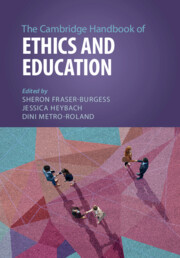Book contents
- The Cambridge Handbook of Ethics and Education
- The Cambridge Handbook of Ethics and Education
- Copyright page
- Epigraph
- Contents
- Figures
- Tables
- Contributors
- Foreword
- Preface
- Acknowledgments
- Part I Traditions in Ethics and Education
- 1 Ancient Chinese Ethics and Education
- 2 Ancient Greek and Roman Ethics and Education
- 3 Ubuntu Ethics and Education in Southern Africa
- 4 Ethical and Environmental Knowledge and Education
- 5 Ethics, Education, and the Inheritance of Abraham
- 6 Prioritizing Outcomes
- 7 Freedom and the Ethics of Educational Authority
- 8 Moral Education in the Virtues
- 9 The Ethics of Bildung and Liberal Education
- 10 American Pragmatism, Democratic Ethics, and Education
- 11 Radical Ethics
- 12 The Ethics of Phenomenology and Hermeneutics in Education
- 13 Feminist Ethics and the Contradictions of Gender
- 14 Postmodern/Poststructuralist Ethics and Education
- Part II Ethics and Education in Practice
- Part III Emerging Ethical Pathways and Frameworks
- Index
- References
10 - American Pragmatism, Democratic Ethics, and Education
from Part I - Traditions in Ethics and Education
Published online by Cambridge University Press: 07 March 2024
- The Cambridge Handbook of Ethics and Education
- The Cambridge Handbook of Ethics and Education
- Copyright page
- Epigraph
- Contents
- Figures
- Tables
- Contributors
- Foreword
- Preface
- Acknowledgments
- Part I Traditions in Ethics and Education
- 1 Ancient Chinese Ethics and Education
- 2 Ancient Greek and Roman Ethics and Education
- 3 Ubuntu Ethics and Education in Southern Africa
- 4 Ethical and Environmental Knowledge and Education
- 5 Ethics, Education, and the Inheritance of Abraham
- 6 Prioritizing Outcomes
- 7 Freedom and the Ethics of Educational Authority
- 8 Moral Education in the Virtues
- 9 The Ethics of Bildung and Liberal Education
- 10 American Pragmatism, Democratic Ethics, and Education
- 11 Radical Ethics
- 12 The Ethics of Phenomenology and Hermeneutics in Education
- 13 Feminist Ethics and the Contradictions of Gender
- 14 Postmodern/Poststructuralist Ethics and Education
- Part II Ethics and Education in Practice
- Part III Emerging Ethical Pathways and Frameworks
- Index
- References
Summary
This chapter provides an introduction to American pragmatism as an ethical tradition with educational ramifications. The chapter first explains the origins of pragmatism and accounts for the primary features of pragmatist ethics. It then profiles the ethical views and educational bearings of two classical pragmatists: William James and John Dewey, and the most prominent neopragmatist, Richard Rorty. The chapter shows how pragmatism, from its nineteenth-century origins to its contemporary iterations, approaches education as integral to the ethical and political cultivation of a vibrant, pluralistic, democratic culture. Its philosophical orientation – away from the fixed and timeless and toward the contingent and contextualized – conceives of humans as active but fallible agents pursuing knowledge to address the concrete problems of their communities. Despite their differences, James, Dewey, and Rorty recognized the need to foster individual habits and collective sensibilities that center our moral imaginations, sympathetic attachments to others, and our situatedness in concrete social and natural environments.
- Type
- Chapter
- Information
- The Cambridge Handbook of Ethics and Education , pp. 186 - 212Publisher: Cambridge University PressPrint publication year: 2024

